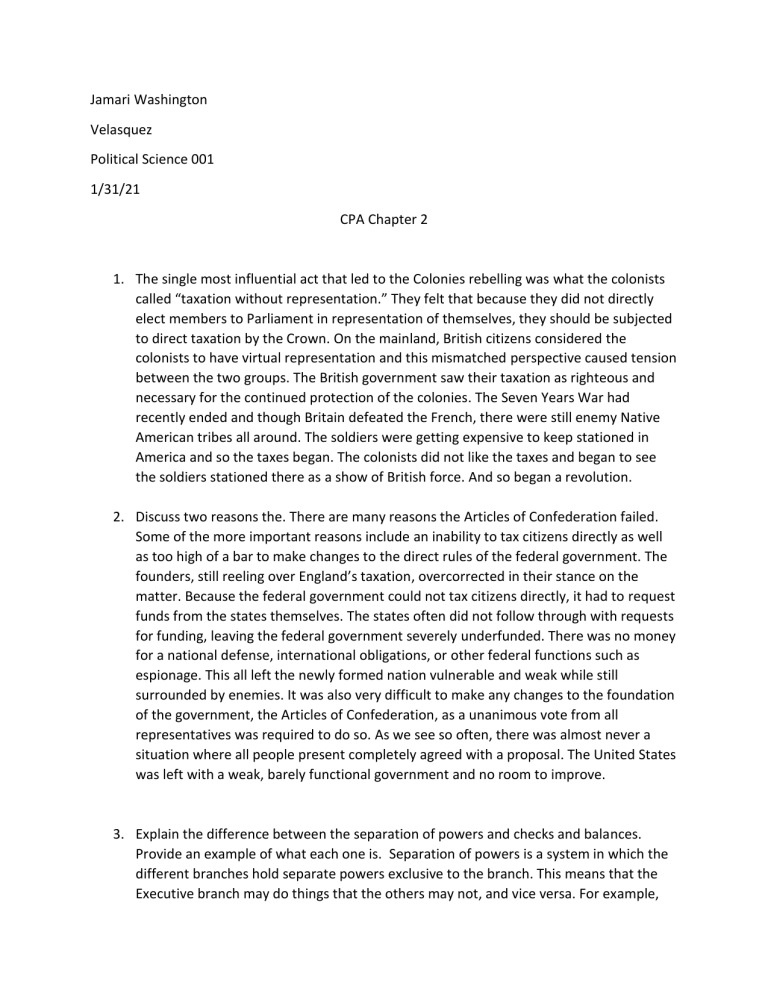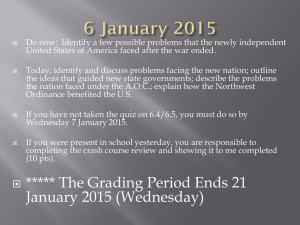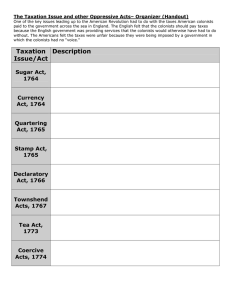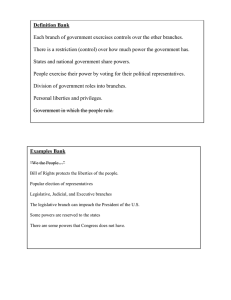
Jamari Washington Velasquez Political Science 001 1/31/21 CPA Chapter 2 1. The single most influential act that led to the Colonies rebelling was what the colonists called “taxation without representation.” They felt that because they did not directly elect members to Parliament in representation of themselves, they should be subjected to direct taxation by the Crown. On the mainland, British citizens considered the colonists to have virtual representation and this mismatched perspective caused tension between the two groups. The British government saw their taxation as righteous and necessary for the continued protection of the colonies. The Seven Years War had recently ended and though Britain defeated the French, there were still enemy Native American tribes all around. The soldiers were getting expensive to keep stationed in America and so the taxes began. The colonists did not like the taxes and began to see the soldiers stationed there as a show of British force. And so began a revolution. 2. Discuss two reasons the. There are many reasons the Articles of Confederation failed. Some of the more important reasons include an inability to tax citizens directly as well as too high of a bar to make changes to the direct rules of the federal government. The founders, still reeling over England’s taxation, overcorrected in their stance on the matter. Because the federal government could not tax citizens directly, it had to request funds from the states themselves. The states often did not follow through with requests for funding, leaving the federal government severely underfunded. There was no money for a national defense, international obligations, or other federal functions such as espionage. This all left the newly formed nation vulnerable and weak while still surrounded by enemies. It was also very difficult to make any changes to the foundation of the government, the Articles of Confederation, as a unanimous vote from all representatives was required to do so. As we see so often, there was almost never a situation where all people present completely agreed with a proposal. The United States was left with a weak, barely functional government and no room to improve. 3. Explain the difference between the separation of powers and checks and balances. Provide an example of what each one is. Separation of powers is a system in which the different branches hold separate powers exclusive to the branch. This means that the Executive branch may do things that the others may not, and vice versa. For example, the Judicial branch can decide that a law put into effect by Congress is unconstitutional and revoke the law unilaterally. The President has some ability to veto any law signed by Congress, but can still be passed over. Just the same, the President controls the military forces of the nation without input from the other branches. In contrast, checks and balances is a system that seems similar but has a different purpose. It prevents any branch from obtaining too much power by giving the other branches certain powers over the first. The Supreme Court ruling any law Unconstitutional is an example of this. The president has the power to appoint Supreme Court Justices, giving him control of who makes up the Court. However, the Senate must confirm any appointments, ensuring the President does not have complete control over the branch. 4. Identify a current check and balance in American government. Explain why it is an example of a check and balance. Which branch is checking the other branch to ensure balance? **Remember to cite the sources you use at the end of your response. Currently, the Legislative Branch is able to check the Executive Branch via Impeachment of the President or Vice-President. If the president oversteps his bounds or acts in a way that harms the country or is unconstitutional, the House of Representatives may choose to raise charges against him. The Senate then holds a trial to determine the legality and severity of his actions. If found guilty, the President is removed from office and is open to criminal prosecution. This all keeps the President focused on his duties to the country and in theory, ensures his loyalty to the people of the country. Halstead, T., 2005. CRS Report for Congress. [Manuscript] 98. 5. Describe the position of the Federalists and the Anti-Federalist. Which group, if any, would you align with and why? Federalists were of the stance that the Federal government needed to be strong in order to provide a better economic base for the country as well as a strong national defense. A well-powered federal government would be able to regulate trade and place tariffs on imported products to support local production. Well regulated trade would provide a strong base for the states to trade internally as well as provide some encouragement to export and make even more money for the country. However Anti-Federalists thought that a strong federal government would favor the elite too much. With the already powerful backed by a strong government, an wealthy elite would rise and take an ever growing amount of control over the rest of the nation. Along with these fears were thoughts that the strong government would impose taxes on those poor citizens that could not afford it and place heavy burdens on the majority of the country, mirroring the harsh treatment so many citizens remembered feeling under England.




